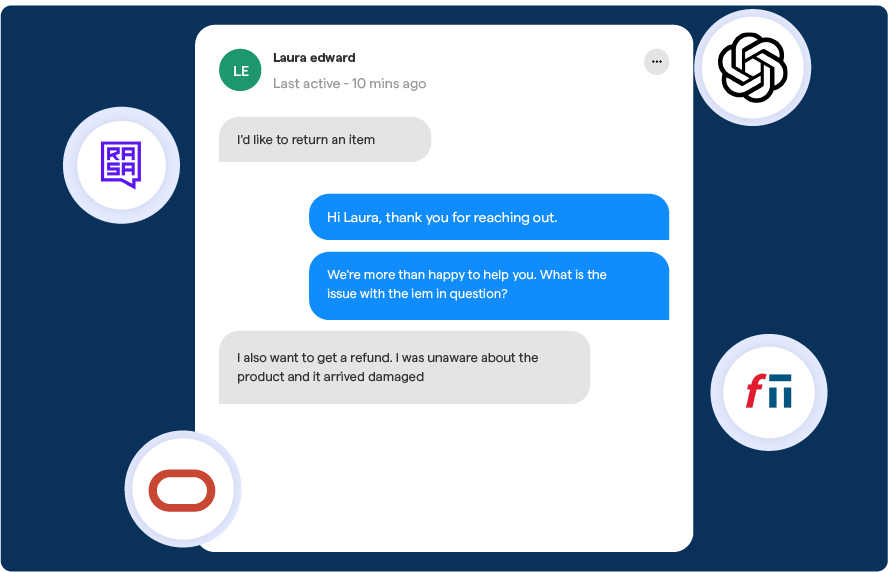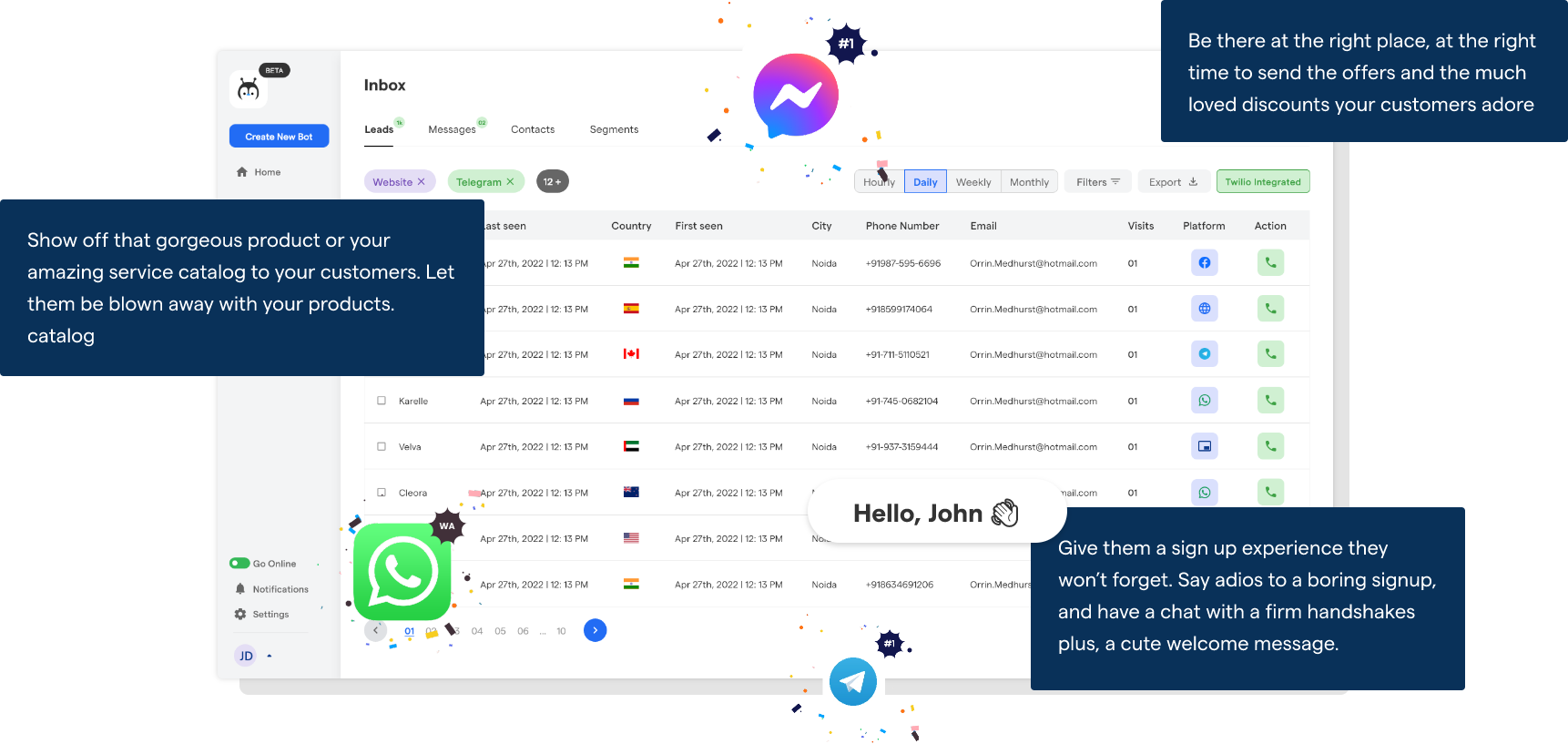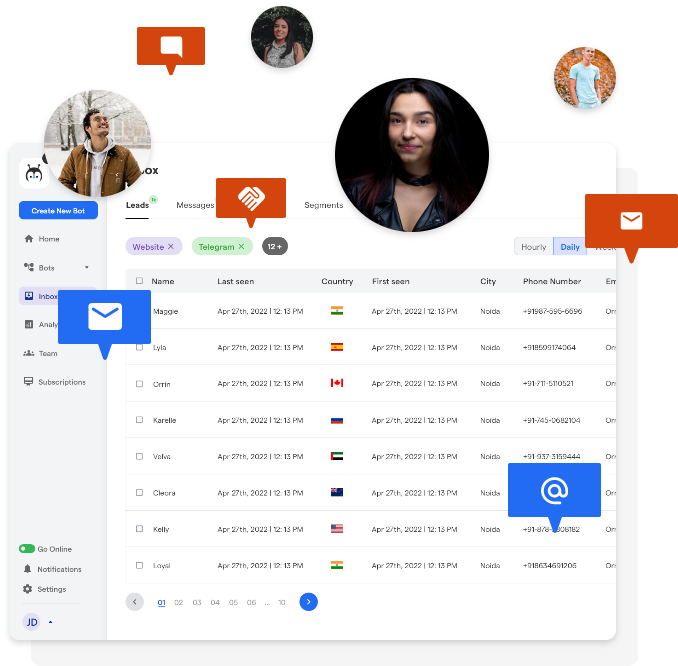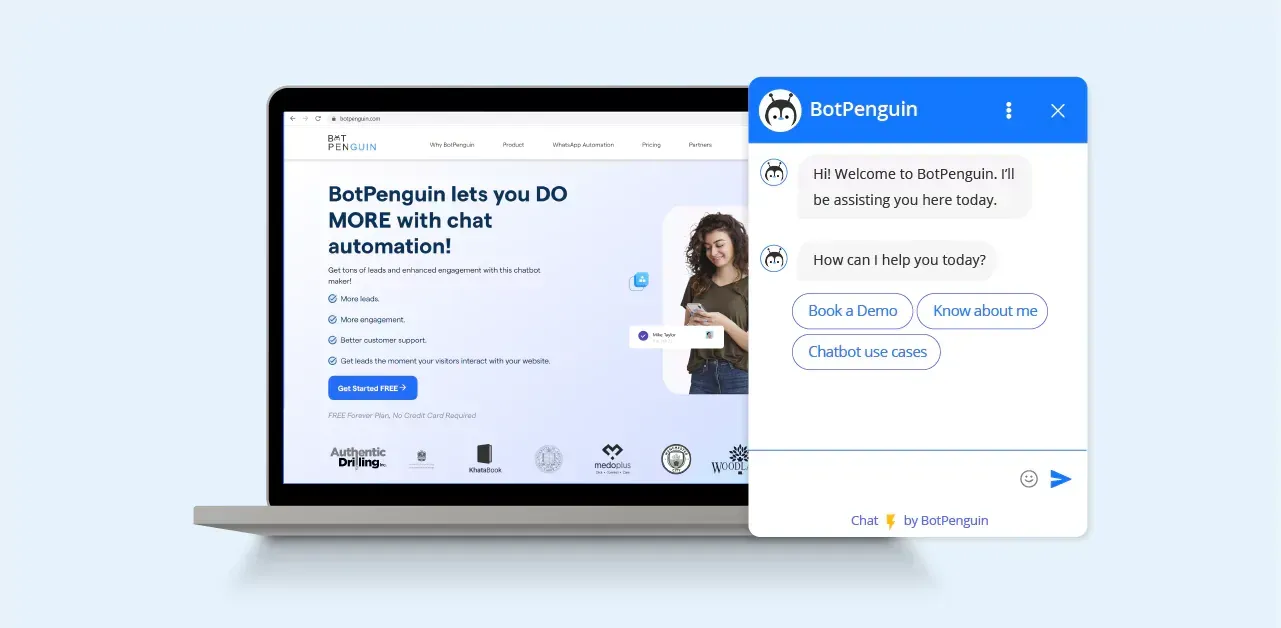Tired of facing a lot of repetitive customer queries? Need more support agents? Chatbots are your answers. By automating routine questions, chatbots save valuable time for customers and employees.
Customers can get instant help 24/7 through messaging apps and websites. No more calls or emails waiting in queues - issues are solved promptly. As chatbots handle basic inquiries, employees have space to focus on more complex problems.
The setup is simple, too - no coding required. Chatbots learn from every interaction to continuously enhance responses. They even understand different languages and contexts to provide personalized service.
Real-time analytics provide insights to refine chatbot performance over time. Bots ensure accuracy while freeing up employees for strategic work. Customer service is transformed with efficient issue resolution and less frustration.
Continue reading to discover how chatbots streamline processes and boost satisfaction when configured correctly. Automation is the key to simplified support - find out how to take your business to the next level.
So, let us begin with an understanding of AI chatbot consultancy.
What is AI Chatbot Consultancy?

AI chatbot consultancy refers to utilizing artificial intelligence-powered chatbots to provide expert advice and customer support.
These chatbots are designed to simulate human-like conversations and engage in real-time interactions with customers.
Using natural language processing and machine learning algorithms, the best AI chatbot consultancy aims to enhance customer satisfaction, streamline support processes, and provide valuable insights for businesses.
How does AI Chatbot consultancy work?
AI chatbot consultancy works by employing intelligent algorithms and data analysis techniques. Here's a simplified breakdown of the process:
Initial Setup
The AI chatbot is developed and trained using vast data, including existing customer interactions, frequently asked questions, and relevant industry knowledge.
Language Processing
The chatbot analyzes customer queries using natural language processing (NLP) algorithms. It understands the intent behind the questions and generates contextually relevant responses.

Knowledge Base Integration
The chatbot is integrated with a knowledge base that contains relevant information and expertise. This allows the chatbot to access accurate and up-to-date information to provide accurate responses.
Real-Time Interactions
Customers interact with the AI chatbot through various channels, such as websites, messaging apps, or voice assistants. The chatbot engages in conversations, clarifies queries, and assists customers based on their unique needs.
Continuous Improvement
The chatbot constantly learns from customer interactions, using machine learning algorithms to improve its responses. This iterative process allows the chatbot to become smarter and more effective at providing consultancy services.
Now, after seeing the work of Chatbot consultancy, let us see the benefits of the best AI chatbot consultancy.
The Benefits of AI Chatbot Consultancy

Artificial intelligence (AI) chatbots have transformed how businesses communicate with customers.
With their ability to understand and respond to human language, AI chatbots offer numerous benefits to businesses that integrate them into their operations.
Improved Customer Service
One of the key benefits of AI chatbot consultancy is improved customer service.
By using AI-powered chatbots, businesses can provide instant responses to customer inquiries. Unlike human agents, chatbots are available 24/7, ensuring customer questions are addressed promptly and efficiently.
This leads to enhanced customer satisfaction and loyalty.
Cost-Effectiveness
AI chatbots also offer cost savings for businesses. Hiring and training human customer service agents can be expensive.
On the other hand, once implemented, AI chatbots require minimal maintenance costs. They can handle a high volume of customer inquiries simultaneously without additional resources, making them a cost-effective solution for businesses of all sizes.
Increased Productivity
AI chatbots can significantly increase productivity for businesses. Chatbots free up human agents to focus on more complex tasks by automating responses to frequently asked questions.
This enhances overall efficiency and enables businesses to handle a larger number of customer inquiries in a shorter amount of time.
Personalization and Customization
AI chatbots can be programmed to provide personalized and customized customer experiences.
Chatbots can deliver tailored recommendations and support by analyzing customer data, resulting in a more engaging and satisfying customer experience. This personalization can help businesses build stronger customer relationships and drive repeat business.

Scalability
Another benefit of AI chatbot consultancy is scalability. AI chatbots can seamlessly handle the additional workload as businesses grow and customer inquiries increase.
They can be easily programmed to accommodate changes in customer demand, ensuring that businesses can scale their customer service operations without compromising the quality of their support.
Now, let us see the limitations of AI chatbot consultancy.
Suggested Reading:
The Limitations of AI Chatbot Consultancy
While AI chatbot consultancy offers many advantages, it is important to consider the limitations of relying solely on chatbots for customer interactions.
Here are some of the limitations that should be considered.
Lack of Emotional Intelligence
One major limitation of AI chatbots is their lack of emotional intelligence. Chatbots may struggle to understand and respond appropriately to complex or emotionally charged queries.
Human agents are often better equipped to handle delicate situations and provide empathetic support, vital in certain customer service scenarios.
Limited Contextual Understanding
AI chatbots operate based on pre-programmed algorithms and rules. As a result, they may need a more contextual understanding.
Chatbots might misinterpret or misrepresent customer inquiries that fall outside their programmed parameters.
On the other hand, human agents can adapt and understand the nuances of customer queries, providing more accurate and relevant responses.
Language Limitations
AI chatbots primarily rely on language processing algorithms to interpret customer messages. They may need help understanding slang, regional dialects, or complex grammatical structures.
This language limitation can lead to misunderstandings and frustrations for the customer and the AI chatbot.
With their linguistic capabilities, human agents can better comprehend and communicate with customers from diverse backgrounds.
Technical Limitations
AI chatbots can experience technical limitations, such as system crashes or glitches. These issues can disrupt customer interactions and result in a poor user experience.
Additionally, AI chatbots may need help handling complex, multi-step processes or requests that require human intervention. Human agents are often necessary for resolving intricate or exceptional situations beyond AI chatbots' capabilities.
Despite these limitations, AI chatbot consultancy can still substantially benefit businesses.
By recognizing these limitations and finding the right balance between AI chatbot automation and human support, businesses can optimize their customer service operations and deliver exceptional customer experiences.
But as technology continues to improve, chatbots are able to defy that gap to an extent that is really remarkable. And, being accurate 95% of the time does not make you a bad choice either.
And beginning with AI-powered chatbot solutions for your business isn't that tough. Meet BotPenguin, the home of chatbot solutions. With all the heavy work of chatbot development already done for you, BotPenguin makes sure that you reach your customers where they are by offering chatbots for multiple platforms, thus making omnichannel support look easy:

Best Practices for AI Chatbot Consultancy
Implementing an AI chatbot consultancy requires careful planning and strategic considerations.
To ensure its success, businesses should follow best practices that maximize the benefits and minimize the challenges of integrating AI-powered chatbots into customer service operations.
Define Clear Objectives and Use Cases
Before implementing an AI chatbot, businesses should clearly define their objectives and determine the specific use cases for the chatbot.
This involves identifying the main purpose of the chatbot, the target audience, and the specific tasks or inquiries it will handle. Businesses can align their chatbot implementation with their broader customer service strategy by having a clear vision and set of goals.
Design User-Friendly Interactions
When designing the interactions and dialogue flows for the AI chatbot, businesses must prioritize simplicity and ease of use.
The chatbot should be programmed to understand and respond to user queries easily. It should provide clear instructions and avoid confusing or ambiguous responses.
Businesses must also consider user behavior and cater to different types of customers, ensuring that the chatbot can handle basic and complex queries effectively.
Ensure Accurate and Up-to-date Information
AI chatbots must be equipped with up-to-date and reliable information to provide accurate responses.
Businesses must invest time in regularly updating and maintaining the knowledge base or database that the chatbot accesses.
This includes ensuring that FAQ sections are kept current and that the chatbot can access real-time data when required. Accurate information ensures that customers receive correct answers and helps build trust in the chatbot.
Implement Continuous Learning and Improvements
AI chatbots can benefit from ongoing learning and improvement processes. Businesses should monitor and analyze the chatbot's conversations to identify areas where it can be enhanced.
By collecting data on user interactions and feedback, businesses can identify patterns, common issues, and areas for improvement.
This information can be used to continuously train and refine the chatbot's algorithms, ensuring that it becomes more intelligent and capable over time.
Provide Seamless Escalation to Human Agents
While AI chatbots can handle a wide range of customer inquiries, there will be situations where human intervention is necessary.
Businesses should ensure a smooth transition from the chatbot to a human agent when required. Implementing a clear escalation process allows customers to seamlessly connect with a human agent without experiencing frustration or disruption in the service.
This ensures complex or emotionally charged queries receive the required attention and support.
Regularly Test and Monitor Performance
To maintain the effectiveness of AI chatbots, businesses should regularly test and monitor their performance. Testing includes simulating different scenarios, checking for bugs or errors, and fine-tuning the chatbot's responses.
Monitoring involves analyzing performance metrics, such as response time and accuracy rates, to identify improvement areas.
Continuous evaluation and adjustment help ensure that the chatbot consistently meets customer expectations.
Seek Feedback and Adapt
Lastly, businesses should actively seek customer feedback regarding their experience with the AI chatbot.
By collecting customer feedback, businesses can gain insights into the chatbot's strengths and weaknesses and identify improvement opportunities.
They can also adapt the chatbot's functionality and behavior based on real-user feedback, ensuring it aligns with customer preferences and needs.
By following these best practices, businesses can maximize the benefits of AI chatbot consultancy.
From setting clear objectives to prioritizing user-friendly interactions and continuous improvement, these practices help deliver an exceptional customer experience using AI technology.
Now it's time to explore the future of customer support and AI chatbots.
Future of Customer Support and AI Chatbots
As technology advances rapidly, businesses are increasingly turning to AI chatbots to change how their customer support operations are conducted.
AI chatbots have the potential to significantly transform the future of customer support, offering improved efficiency, convenience, and personalization.
Let's explore the various ways AI chatbots are shaping the future of customer support.
Enhanced Efficiency and Availability
AI chatbots provide businesses with round-the-clock customer support, enhancing efficiency and availability.
Unlike human agents, who are limited by working hours, chatbots are available 24/7 to assist customers with their inquiries.
This means that customers can receive support anytime, leading to faster response times and increased customer satisfaction.
Advanced Natural Language Processing
Advancements in natural language processing (NLP) technology have greatly improved the capabilities of AI chatbots.
Modern AI chatbots have advanced NLP algorithms that can accurately understand and interpret human language.
This enables chatbots to engage in more complex conversations and provide accurate and contextually relevant responses to customer inquiries.
Seamless Integration Across Channels
The future of customer support lies in seamless integration across multiple channels.
AI chatbots can be integrated into websites, messaging platforms, social media platforms, and voice assistants.
This allows businesses to provide consistent and efficient support across various channels, enabling customers to choose the platform that suits them best.
Personalized Customer Experiences
AI chatbots can deliver personalized customer experiences by analyzing customer data and preferences.
With access to customer history and behavior patterns, chatbots can provide tailored recommendations, product suggestions, and personalized support to enhance the customer experience.
This level of personalization helps build stronger customer relationships and fosters brand loyalty.
Collaboration Between AI and Human Agents
The future of customer support is not about replacing human agents with AI chatbots but rather facilitating collaboration between the two.
AI chatbots excel at handling routine, repetitive, and simple customer inquiries. This allows human agents to focus on more complex, high-value tasks requiring critical thinking and emotional intelligence.
Businesses can use AI and human strengths to create a more efficient and satisfying customer support experience.
Continuous Learning and Improvement
AI chatbots can continuously learn and improve through machine learning algorithms.
Chatbots can identify patterns and refine their responses by analyzing past interactions and customer feedback.
This continuous learning process enables chatbots to become smarter, more accurate, and more effective in providing customer support.
Empathy and Emotional Intelligence
While Best AI chatbot consultancy excels in many areas, its limitations lie in empathetic and emotionally charged interactions.
Customers sometimes require human interaction to address sensitive or complex issues. In the future, businesses must balance efficient AI chatbot support and the human touch, especially in situations that require empathy and emotional intelligence.
Integration with Emerging Technologies
AI chatbots are expected to integrate with emerging technologies to enhance customer support further.
For example, chatbots can be integrated with augmented reality (AR) or virtual reality (VR) technology to provide visual instructions or support. This would enable businesses to offer immersive troubleshooting experiences and step-by-step guidance, changing how customers receive assistance.
The future of customer support lies in the seamless integration of AI chatbots into businesses' support operations.
Through advanced technologies like natural language processing, personalization, and collaboration between AI and human agents, businesses can deliver efficient, personalized, and satisfying customer support experiences.
As technology continues to evolve, AI chatbots will play an increasingly crucial role in shaping the future of customer support.
Take the Stress out of Customer Support - Automate with BotPenguin Consultancy Chatbots
Are you ready to take your customer support to new heights? BotPenguin makes chatbots simple and effective.
Our end-to-end platform handles everything from setup to ongoing support. No coding or technical skills are needed - just point, click, and talk.
With BotPenguin, your chatbots will be up and running in no time. Your customers get fast, friendly assistance 24/7 through messaging apps and websites.
Bots learn from every interaction to continuously improve their responses. Real-time analytics provide insights to optimize the experience.
BotPenguin's Best AI chatbot consultancy experts are available to help configure bots, troubleshoot problems, and refine performance. We ensure your chatbots always meet customer expectations without extra effort from you.
Automating repetitive queries will save time and money while boosting satisfaction.
Employees can focus on high-value tasks. Customers get the personalized service they expect.
It's time to bring your support to new levels. BotPenguin handles the heavy lifting so you can focus on growth. Stop wasting effort and start enhancing the customer journey. Our intuitive platform makes chatbots a breeze - take it for a test drive today.
Suggested Reading:
Frequently Asked Questions
What is AI consultancy?
AI consultancy uses artificial intelligence to provide advisory services, insights, and solutions to businesses. It employs AI technologies to analyze data, automate processes, and enhance decision-making in various sectors, including customer support.
What is the best AI chatbot for consultancy?
Determining the best AI chatbot consultancy depends on specific business needs, integration capabilities, scalability, and the level of customization required. Some leading options include IBM Watson Assistant, Dialogflow by Google, and Microsoft Azure Bot Service.
How much does it cost to have an AI chatbot for consultancy?
The cost of an AI chatbot consultancy varies widely based on factors like complexity, features, development time, and ongoing maintenance. Basic chatbots might start at a few thousand dollars, while more sophisticated, customizable solutions can cost tens of thousands or more.
How can AI be used for consulting?
Best AI chatbot consultancy aids in data analysis, trend identification, predictive modeling, and automation. It assists in streamlining operations, providing personalized recommendations, enhancing customer interactions, and improving decision-making processes for consultants and clients.



